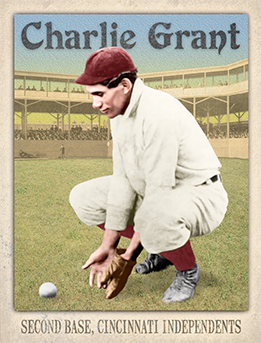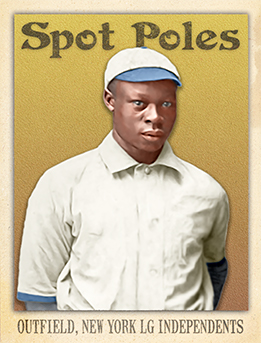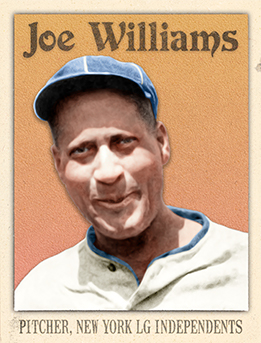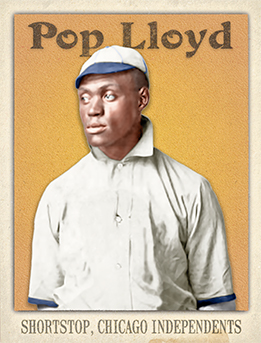
- Series: Diamond Heads '15
- City: Cincinnati
- Team: Stars (IND)
- League: Independent
Charles Grant Jr. (1874-1932) replaced Sol White at second base in 1896 when White left the Page Fence Giants, a move that came back to bite White's Cuban X-Giants later that year when Grant's team won the championship series 10 games to 5. Page Fence folded in '99 and Charlie moved to the Columbia Giants of Chicago. But is wasn't his prowess afield in the early Black leagues that brought Grant to the razor's edge of history. The smooth-fielding youngster worked in a hotel in Hot Springs, AR in the off-seasons where John McGraw's Orioles trained. McGraw, ever-voracious for talent, spied Grant playing pick-up games with co-workers and immediately judged him to be of major league caliber. The color-line was obdurate but McGraw seized on the ploy of passing Grant off as a Native American, even dubbing him “Tokohama” after a name he saw on the hotel's map. The scheme almost worked. Sol White tells the story of how McGraw's efforts to surreptitiously integrate the American League foundered when Baltimore went up to Chicago en route from spring training. Comiskey noticed that Grant's friends in town had shown up to applaud him and even sent a bouquet. Outed, McGraw had to yield to the league's segregation. White shared McGraw's esteem for Grant's ability: “I will give any 'fan' a good ten-cent cigar who will call my attention or, rather, recall my memory to an error on a ground ball or a muffed fly by Charley Grant.” His chance at national fame thwarted, Grant continued a very successful career in Black ball.
- Never a strong hitter, Grant always earned his keep at second. He died tragically, struck by a car that had blown a tire. In death, this great player received a measure of the recognition of which he was deprived by baseball's moguls. He is buried a short distance from Hall of Fame second-sacker Miller Huggins at Spring Grove Cemetery in Cincinnati
- Series: Diamond Heads '15
- City: New York
- Team: Lincoln Giants
- League: Independent
- Hall: National Baseball Hall of Fame
Joseph Williams (1886-1951) may have been the best pitcher never to appear in the major leagues. He starred in the Negro Leagues and in Cuba and Mexico over a 27-year career. His best year was 1914 (an amazing 41-3). Playing against MLB players in barnstorming games, Williams compiled a 20-7 record over the “best” in the game.
- At age 44 in 1930, closed his career with a 1-0, 12-inning win striking out 27 KC Monarchs
- That same year, in his only confrontation with the rising star, beat Satchel Paige 1-0.
- Elected to Hall of Fame: 1999
- Series: Diamond Heads '15
- City: Chicago
- Team: American Giants
- League: Independent
- Hall: National Baseball Hall of Fame
John Lloyd (1884-1964) was one of the best shortstops in baseball history. Called by whites the “Black Wagner,” Honus himself deemed that association with Lloyd an honor. Lloyd was a pillar of black baseball with a lifetime Negro League BA of .343. He also spent 12 seasons in the Cuban League, batting .329.
- Babe Ruth called Lloyd the best baseball player ever
- Elected to Hall of Fame: 1977
- Series: Pioneer Portraits I: 1850-1874
- City: Marshalltown
- Team: Stars (Amateur)
- League: Independent
- Hall: National Baseball Hall of Fame
Adrian Constantine Anson (1852-1922) was Mr. Longevity, a big, brawling cyclone of controversy & batsmanship unrivaled in the early days of pro ball. He set hitting standards that only the greatest future players would approach or break. He also, by dint of his ferocious personality, may have been the single greatest force for segregation in baseball until Branch Rickey began to reverse that sad estate.
- Played a record 27 consecutive years in the NL
- First batter to 3000 hits, using his powerful arms to create line drives with a short swing
- Managed the Chicago NL team to five pennants and still holds the Cub franchise records for hits, doubles, runs scored and runs batted in
- Elected to Hall of Fame: 1939

- Series: Diamond Heads '15
- City: New York
- Team: Lincoln Giants
- League: Independent
Spottswood Poles (1889-1962) was ranked by renowned athlete and singer Paul Robeson as one of the four most talented black athletes of the first half of the 20th century, along with Jesse Owens, Joe Louis and Jack Johnson. Fast company for a fleet-footed outfielder who was once timed in a sub-ten-second 100 yard dash. Spot was raised in Harrisburg, PA and came up with the sports clubs for colored kids. His talent led him to debut with Sol White's Philadelphia Giants in 1909. He was a hit. And could he hit: averaging well over .400 for four seasons. He followed his mentor to New York's Lincoln Giants and remained with various NY clubs until returning to Philly and Ed Bolden's Hilldale Club. Some highlights of his time with the Lincolns included defeating Rube Foster's powerhouse Chicago American Giants and proving his mettle against all competition, including getting three straight hits off Grover Cleveland Alexander in one of the exhibition games played against major league teams. Spot enlisted with the 369th Infantry Regiment, dubbed by their German foes the Hellfighter Regiment for their implacable defense (never giving up a trench or a yard of battlefield), and earned five battle stars and a Purple Heart. The 369th was the first African American unit in WWI and was assigned to the French forces who knew them as “The Men of Bronze”. They called themselves the Harlem Hellfighters. After the war, Poles knocked around before settling back with Hilldale.
- Playing in Cuban and Negro ball, Poles is cited in some sources as averaging over .400 lifetime, a stat not corroborated by Baseball Encyclopedia. Suffice to say, he was one of the best hitters of his or any era
- John McGraw pegged Spot as one of four black players he'd have put in the majors, with Pop Lloyd, Smokey Joe Williams and Cannonball Dick Redding
- The decorated war hero is buried in Arlington National Cemetery with his wife Bertha




